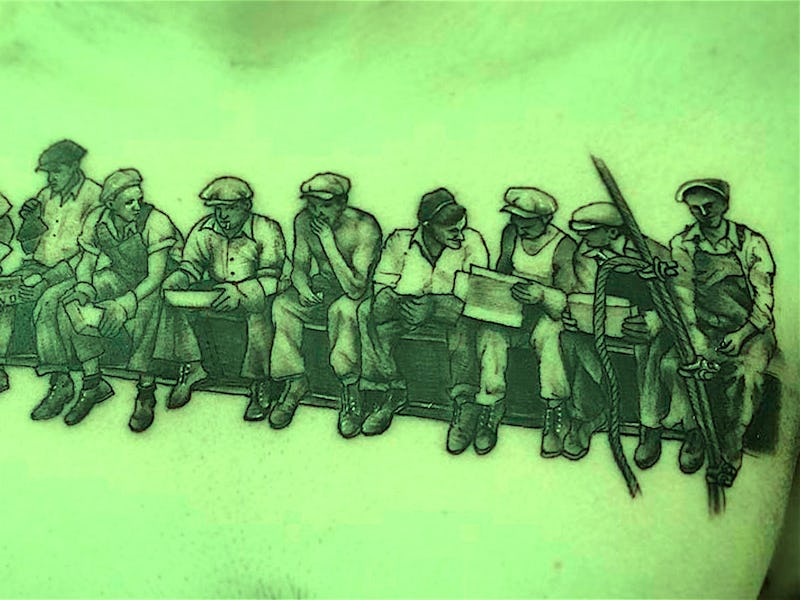Could Future Labor Days Become Celebrations of Basic Income?
How will we celebrate Labor Day when less of us are actual laborers?

Labor Day was made into an federal holiday back on June 28, 1894, when President Grover Cleveland finally declared that the first Monday of each September be marked as a day to recognize and honor workers and unions, then a powerful political force. The people who built America’s iconic buildings and railroads that connected the continent and set up America for a century of growth and prosperity, should be given the day off, it was decided.
But 123 years later, the number of those working-class jobs is being reduced, partly because of robotics and automation that only seem poised to expand their footprint in the coming years. Meanwhile, white-collar and service workers are seeing how artificial intelligence could be used to make decisions — about investing, medicine, and retail, to name a few — once left to humans.
A report from PricewaterhouseCoopers in March projected that 40 percent of jobs in the United States could potentially be replaced by automation in the next fifteen years.
Sculptor Sergio Furnari paid tribute to the famous photo by TK, "Lunch Atop a Skyscraper," one of the most iconic representations of American labor. The original photo was shot on September 20, 1932, on the 69th floor of the RCA Building during the last months of construction.
Enter the concept of universal basic income, which has seen in the last three years support from people at the highest levels in business and politics. Count among basic income’s vocal supporters Elon Musk, Richard Branson, and Mark Zuckerberg.
Those on the sidelines see automation as the biggest factor for moving to UBI when unemployment goes up.
“A big factor me is automation,” says Owen Poindexter, a co-host on The Basic Income Podcast “The work we’re doing can be automated successfully in ways that it couldn’t before. Robots are getting smarter and more able to do human labor, and they’re a whole lot cheaper than a human who you have to pay every two weeks.”
Labor Day has been the day to honor the work done by Americans, but what happens when less Americans do that work, when there are less Americans working? A massive economic disruption, created by machines that don’t require salaries and healthcare, is on the horizon, said President Barack Obama in the final days of his administration.
“The next wave of economic dislocation won’t come from overseas,” Obama said his farewell address in January. “It will come from the relentless pace of automation that makes many good, middle-class jobs obsolete.”
Could universal basic income fill the economic gap that will be created by the loss of jobs once performed by laborers? A study by the left-leaning Roosevelt Institute released just before Labor Day projected that a basic income of $1,000 per month for every American adult could enable the economy to grow by $2 trillion by the year 2025.
But veteran policy writer Bob Greenstein explained to Vox earlier this year that the introduction of basic income in the United States might mean the reduction of other social services, like food stamps, medicaid, low-income housing, child care, job training, or Pell grants for low-income college students.
But, on, say Labor Day 2037, when far less Americans are using their hands to build this century’s railroad — the hyperloop? — and instead, the majority of work done by machines operated by a handful of humans, will Labor Day be spent recognizing how we all have to work less, and perhaps lead happier lives? It’s not out of the question to wonder how we will celebrate Labor Day when far less of us are actual laborers.
“Now it’s time for our generation to define a new social contract,” said Facebook founder Mark Zuckerberg to this year’s graduating class at Harvard. “We should explore ideas like universal basic income to make sure that everyone has a cushion to try new ideas.”
Zuckerberg, presumably doesn’t want to do away with social services and introduce basic income, as Greenstein suggested to Vox.
Poindexter, the podcast host, says that some fields — the new labor, if you will — will be expanded due to automation and artificial intelligence. As AI creates new systems and services, there will need to be people who start those businesses that offer those services.
“There are a lot of advances in legal tech that can make lawyer services a lot cheaper, that could really expand the number of people that seek them out,” he says, before noting that self-driving semi trucks could wipe out the industry as a whole within a couple years of their introduction.
The point about self-driving vehicles is one made often by Elon Musk, CEO of electric automaker Tesla — and the industry’s current leader in autonomous tech — who says when it comes to creating a system for basic income, it’s not a matter of if but when.
“There will be fewer and fewer jobs that a robot cannot do better,” Musk said in February. “What to do about mass unemployment? This is going to be a massive social challenge. And I think ultimately we are going to have some sort of universal basic income. I don’t think we have any choice.”
Labor Day as we know it — marked by union parades marching through America in cities large and small — may not look significantly different for decades, but if “everyone has a cushion to try new ideas,” as Zuckerberg told those Harvard grads, the work that is honored on Labor Day may look different much sooner.